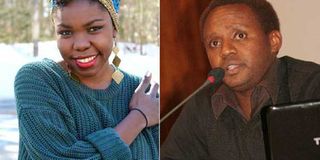Writer hopeful of ending Kenya's literary prize drought

Okwiri Oduor and Billy Kahora are in the running for the prestigious annual awards for her short story “My Father’s Head.” Oduor hopes that her journey in writing will serve as an inspiration for other writers. PHOTO/FILE
What you need to know:
- Okwiri Oduor, who was shortlisted along Billy Kahora in the prestigious annual awards for her short story “My Father’s Head,” hopes that her journey in writing will serve as an inspiration for other writers.
- Having been shortlisted for the award provided an opportunity for Okwiri to be read widely and for her to be able to exchange ideas with fellow writers during the ongoing workshops in London.
- When the award patron, Nigerian great Wole Soyinka, made the announcement on April 22, it was laudable that the country had two writers nominated out of the possible five nominees.
One of the Kenyan writers shortlisted for this year’s Caine Prize for African Writers to be awarded on Monday is hoping to bring the prize home, 11 years since the last Kenyan won.
Okwiri Oduor, who was shortlisted along Billy Kahora in the prestigious annual awards for her short story “My Father’s Head,” hopes that her journey in writing will serve as an inspiration for other writers.
Okwiri started her writing career in Storymoja and Amka events and has published with Kwani?, Amka, Saraba, FEMRITE, The New Inquiry and African Writing online.
Storymoja is a writers’ organisation that publishes and helps distribute the works of local writers and also organises Hay Festivals while Amka is a forum for female writers.
The writer of the novella The Dream Chasers told Nation.co.ke that she was happy her works had earned her a shortlisting at the awards.
“The shortlisting came as a surprise to me and whether I win or not, I will be happy that I came this far,” said the young writer.
Okwiri’s “My Father’s Head” is a surreal and haunting tale of a young woman whose dead father has returned to visit. The story explores the themes of ageing, belonging and the meaning of family.
Okwiri stated that all stories shortlisted for the prize are strong and whoever wins will have done exceptionally well.
Apart from Okwiri and Kahora, the other writers who made the short lists this year are Diane Awerbuck (South Africa), Efemia Chela (Ghana/Zambia) and Tendai Huchu (Zimbabwe).
Only two Kenyan writers — Binyavanga Wainaina (2002) and Yvonne Adhiambo Owuor (2003) — have previously won the Caine Prize.
“I will keep writing (whatever) the outcome on Monday, I want to serve as a motivation to many writers out there that writing can be a full-time career,” she said.
Having been shortlisted for the award provided an opportunity for Okwiri to be read widely and for her to be able to exchange ideas with fellow writers during the ongoing workshops in London.
“We have been attending workshops and even festivals where I have interacted a lot with other writers from across the world and learnt a lot from them,” she added.
A win for her would mean a lot for the country that has seen many budding writers coming up, especially with projects like Kwani? and Storymoja that provide opportunities for young writers.
“A win for either of us will serve as an encouragement to the writers in Kenya and provide us with an opportunity to make writing a full-time career that can inspire even young people to join,” she added.
When the award patron, Nigerian great Wole Soyinka, made the announcement on April 22, it was laudable that the country had two writers nominated out of the possible five nominees.
This is Kahora’s second shortlisting, his first time having been in 2012 with the story “Urban Zoning”.
Kahora’s “The Gorilla’s Apprentice” is set in Nairobi during the 2007 post-election crisis. In the story, the gorilla ostensibly dies from taking upon itself the psychic load of the Kenyan collective at the time.
Other Kenyans who have been shortlisted since the inception of the Caine Prize 15 years ago have been Lily Mabura, Muthoni Garland, Parsalelo Kantai and Mukoma wa Ngugi.
This year’s award ceremony takes place on Monday at the Bodleian Library at the University of Oxford in Britain.





